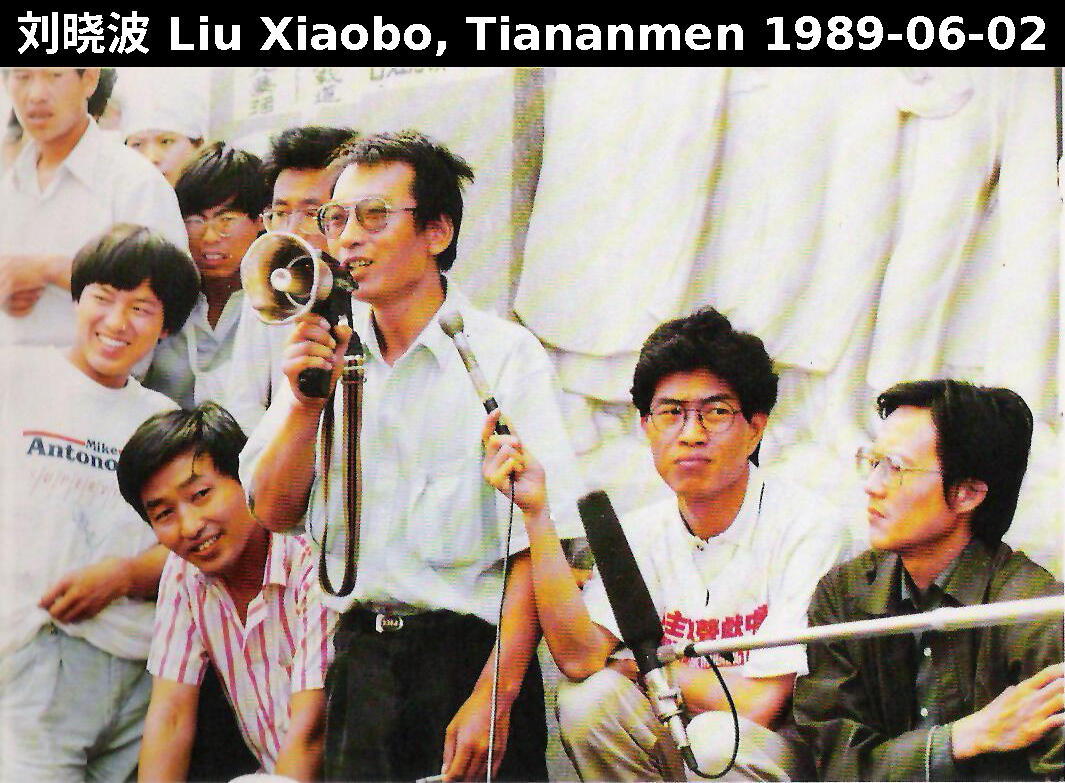18.1.6. Liu Xiaobo (刘晓波, 1955-2017, Tiananmen leader)
He was abroad in the 80' as a scholar, and then he came back to china in 1989 to support Tiananmen Square Protests of 1989 (六四事件), then he was in and out of jail until he died in 2017.
His 2020-06 Baidu Baike (百度百科, Chinese censored Wikipedia clone) https://baike.baidu.com/item/刘晓波/14900221 (https://web.archive.org/web/20200627130112/https://baike.baidu.com/item/%E5%88%98%E6%99%93%E6%B3%A2/14900221) casually forgot to mention that he might have won the fucking 2010 Nobel Peace Prize, but he seems to be too big to delete the entire page?
It is interesting how Hao Haidong (郝海东, 2020, soccer player) was fully deleted, the page was only locked. It also does not mention all the times he was in jail, notably after Tiananmen, only some of them.
2017-11 Baidu did mention the Nobel prize however: https://web.archive.org/web/20171114165644/https://baike.baidu.com/item/%E5%88%98%E6%99%93%E6%B3%A2/14900221 it was edited out later.
The article also makes it very clear that his 2009 sentence was "a fair one", and that the organization he worked for in the 90', Federation for a Democratic China (民主中国阵线) was funded by the CIA. Wikipedia does not mention that however, but of course, Baidu content does not need citations.
 Figure 233. Liu Xiaobo (刘晓波, 1955-2017, Tiananmen leader) at Tiananmen Square Protests of 1989 (六四事件) on 1989-06-02. He is the second from left, with the speaker. The background seems to be Monument to the People’s Heroes (人民英雄纪念碑), and this seems to be a still from a video, TODO identify. That monument cellebrate the Chinese Communist Revolution (1921-1949), and ironically contains images of students from May Fourth Movement (五四运动, 1919) protesting at Tiananmen. Liu was one of the people who was begging the students to leave the square once he felt that the government would violently crack down, in order to save lives. For this is considered one of the four Junzi (君子) of Tiananmen (天安門四君). Other people in the photo from left to right: Zhou Duo (周舵). Ji Gaoxin (及高新). Some/all of the junzi felt that peaceful cooperation with the government was the only way forward. This is opposed to the views of others such as Chai Ling (柴玲), who felt that the sight of blood was necessary to wake up the Chinese masses. Another photo of the four: https://hk.news.yahoo.com/天安門四君子之-周舵認為放下敵我才能推動民主-232800167.html. The term is also a reference to the Four Gentlemen (花中四君子), four plants commonly depicted in Chinese traditional painting of plants. At The Gate of Heavenly Peace (1995, 天安门纪录片) 1:46:14, Liu Xiaobo mentions how some students had the delusion that they would actually be able to stand up to the army. Source
Figure 233. Liu Xiaobo (刘晓波, 1955-2017, Tiananmen leader) at Tiananmen Square Protests of 1989 (六四事件) on 1989-06-02. He is the second from left, with the speaker. The background seems to be Monument to the People’s Heroes (人民英雄纪念碑), and this seems to be a still from a video, TODO identify. That monument cellebrate the Chinese Communist Revolution (1921-1949), and ironically contains images of students from May Fourth Movement (五四运动, 1919) protesting at Tiananmen. Liu was one of the people who was begging the students to leave the square once he felt that the government would violently crack down, in order to save lives. For this is considered one of the four Junzi (君子) of Tiananmen (天安門四君). Other people in the photo from left to right: Zhou Duo (周舵). Ji Gaoxin (及高新). Some/all of the junzi felt that peaceful cooperation with the government was the only way forward. This is opposed to the views of others such as Chai Ling (柴玲), who felt that the sight of blood was necessary to wake up the Chinese masses. Another photo of the four: https://hk.news.yahoo.com/天安門四君子之-周舵認為放下敵我才能推動民主-232800167.html. The term is also a reference to the Four Gentlemen (花中四君子), four plants commonly depicted in Chinese traditional painting of plants. At The Gate of Heavenly Peace (1995, 天安门纪录片) 1:46:14, Liu Xiaobo mentions how some students had the delusion that they would actually be able to stand up to the army. Source
He was abroad in the 80' as a scholar, and then he came back to china in 1989 to support Tiananmen Square Protests of 1989 (六四事件), then he was in and out of jail until he died in 2017.
His 2020-06 Baidu Baike (百度百科, Chinese censored Wikipedia clone) https://baike.baidu.com/item/刘晓波/14900221 (https://web.archive.org/web/20200627130112/https://baike.baidu.com/item/%E5%88%98%E6%99%93%E6%B3%A2/14900221) casually forgot to mention that he might have won the fucking 2010 Nobel Peace Prize, but he seems to be too big to delete the entire page?
It is interesting how Hao Haidong (郝海东, 2020, soccer player) was fully deleted, the page was only locked. It also does not mention all the times he was in jail, notably after Tiananmen, only some of them.
2017-11 Baidu did mention the Nobel prize however: https://web.archive.org/web/20171114165644/https://baike.baidu.com/item/%E5%88%98%E6%99%93%E6%B3%A2/14900221 it was edited out later.
The article also makes it very clear that his 2009 sentence was "a fair one", and that the organization he worked for in the 90', Federation for a Democratic China (民主中国阵线) was funded by the CIA. Wikipedia does not mention that however, but of course, Baidu content does not need citations.
